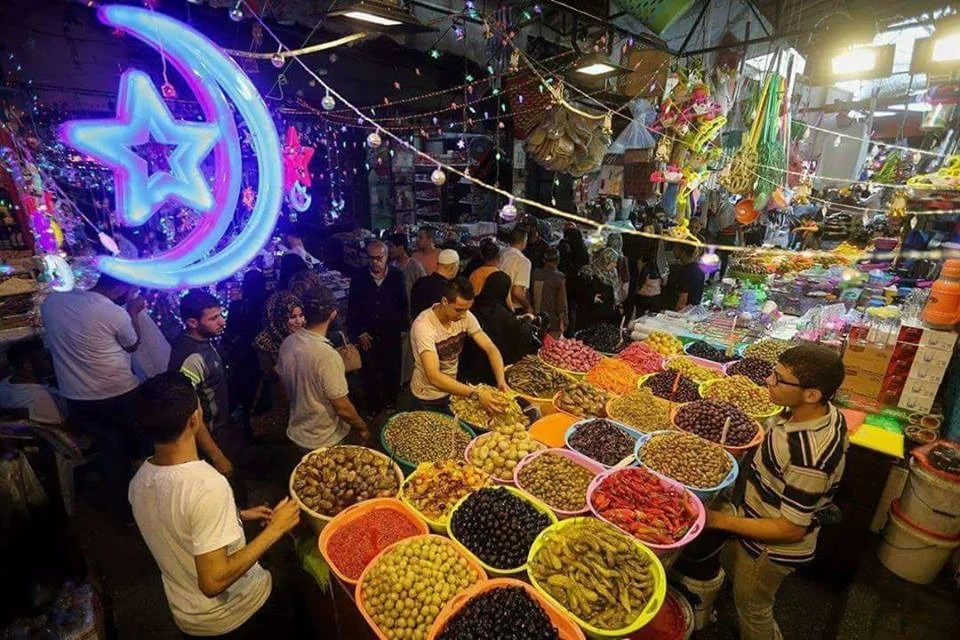What Ramadan and Eid Mean to Gaza
What Ramadan and Eid Mean to Gaza
By Raed Shakshak, We Are Not Numbers
“We love you, Ramadan! We fast [during] you, Ramadan!” chant little kids every year a few days before the holy month kicks off. The chant marks the official start of Ramadan, eagerly anticipated by everyone no matter how harsh life is at the time. Most non-Muslims know the Islamic holiday of Ramadan as a month of fasting. And how fun can that be? But Ramadan and the Eid (breaking the fast) festivities that follow are so much more than that.
Ramadan in Gaza
During Ramadan, people socialize more than at any other time of year. (In fact, during Eid, we literally visit every relative we have. It’s often exhausting!) For kids, it's a month when they buy fireworks and have a little party of their own almost every evening after iftar (the daily meal when Muslims break their fast, around sunset).
For women, Ramadan is the month when they gather to make traditional desserts, like qatayef, a fried pancake filled with cheese, nuts and sugar; kaak, a donut-shaped cookie; and maamoul, a filled pastry. Those snacks are hard to make alone, but when women make them together, they have fun. They talk, laugh and stay up all night so they can make large quantities at one time. It’s almost a sport to them, like soccer. They play as a team!. These sweets are the taste of Ramadan.
On the other hand, Ramadan can be a bit stressful for men, who are primarily responsible for supporting their families financially. During Eid, fathers and husbands are expected to treat children and women with Eidiyah, or pocket money. Still, men enjoy Ramadan too. They sit outdoors together before the last prayer of the day, talk, and drink tea and coffee. and the host offers Ramadan’s desserts to his guests. Their laughter rings throughout the streets.
Then there are the sounds--like takbeer (a magical, mesmerizing chant, saying Allahu akbar, or God is the greatest) performed before the first prayer of the day during Eid, and taraweeh (night prayers said during Ramadan). Just before dawn, the Ramadan dummer (called the musaharati) wanders the streets, waking everyone up tso they can eat before they fast again.
And let’s not forget the sights: Bright-hued flags and crescents are strung with tiny lights on the walls and people carry glowing lanterns. Vendor stalls are stocked with small toys given to children along with money during Eid.
During the last few days of Ramadan, the markets are crowded as people buy new clothes in which to celebrate Eid al-Fitr (“little” Eid; the “greater” Eid is in the fall). Downtown’ roads often are declared off limits to cars so there is more room to buy and sell goods. Meanwhile, men and women get fresh haircuts or styles. Everyone has a new look. It’s a symbol of a new start in life.
Some families are so poor they simply cannot celebrate Ramadan as it should be. They cannot make snacks/desserts or buy new clothes. It is like a Christmas without trees and gifts. Sometimes people are so broke hey don’t even visit their relatives; they are too embarrassed.
A little girl receives a gift of clothes from Rebuilding Alliance (Photo by Sanad Latefa)
Fortunately, Ramadan is God’s month, and God sends good people to help the poor. Those who have money help those who don’t in various ways. They invite them to iftar meals, donate money or gift them with new clothes. In addition, there are NGOs that work hard to feed and clothe the poor, although their coffers are scant as well. Among the helpers is the American NGO Rebuilding Alliance and its Gaza partners, El-Amal Rehabilitation Society and the Women’s Programs Center.
“We managed to benefit more than 200 families in Rafah City, where some of the neediest residents live,” says Kareem Nasrallah, Rafah coordinator for Rebuilding Alliance. “The children were so happy they finally got new clothes for Eid after completely losing hope.”
Another Rebuilding Alliance Partner, Youth Vision Society, distributed 20 food baskets to the poorest families in Shati Camp and helped 60 families buy Eid clothes for their 134 kids.
Photo by: Sanad Latefa
"It warmed my heart to see families receive food and kids choose their own Eid clothes and shoes,” says Neveen Nasser, Gaza City coordinator for Rebuilding Alliance. “I'll never forget the children’s heart-touching smiles as they got ready for Eid with nice outfits."
Ramadan and Eid al-Fitr are a break from life. They are missed as soon as they are over. Actually, people start missing Ramadan on its first day. How ironic is that! They say, “Gotar\Goter Ramadan (Gotar\Goter means leave\left). One day is gone, two tens and nine (29 days) are left.”
Words can’t adequately describe how much Muslims love this month. And because of its blessings, Muslims pray they make it to next year’s Ramadan. May God bless Muslims everywhere and forgive their sins by the end of Ramadan. Amen.



